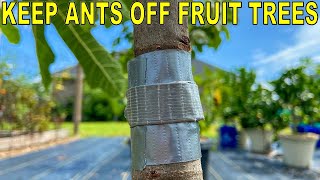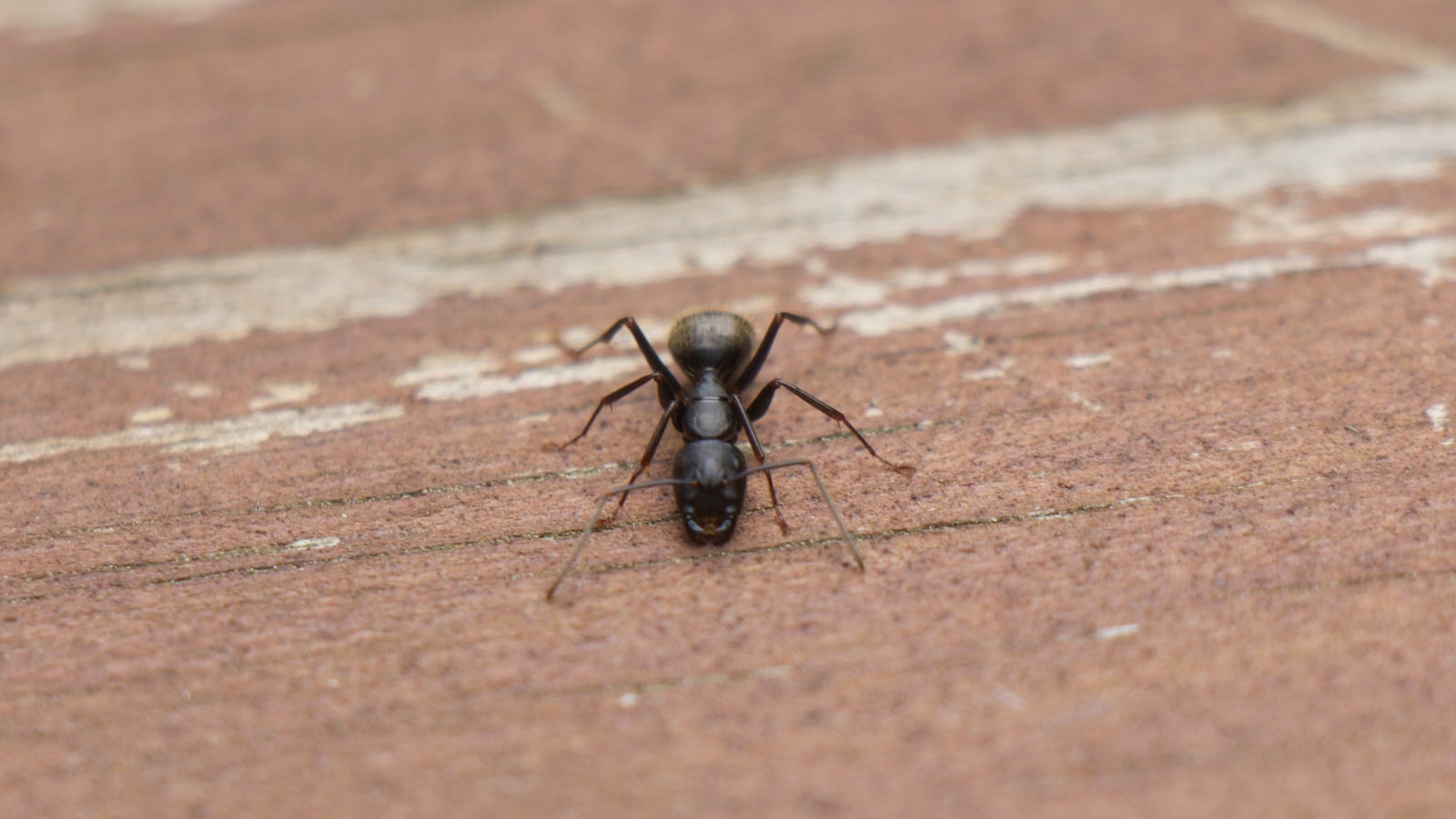
In the enchanting realm of nature’s bounty, fruit trees stand tall as magnificent guardians of lusciousness, offering sweet gifts to our taste buds and nourishment to our bodies. Yet, in this picturesque orchestration of growth, an uninvited flurry of tiny intruders can disrupt the harmonious balance: ants. With their unwavering determination and insatiable appetite, these industrious creatures seek to invade the sanctuary of our beloved fruit trees. But fear not, dear orchard enthusiasts, for in this ethereal guide, we shall unlock the secrets to keep ants at bay, ensuring our fruit trees flourish in peace. These enchanting guardians deserve to bear fruit undisturbed, and together, we shall unveil the mystical art of warding off ants from our fruitful havens.

Preventing Ant Infestation in Fruit Trees: Insights and Recommendations
As a fruit tree owner, it can be disheartening to witness your precious fruits being invaded by pesky ants. Not only are ants attracted to the sweet nectar of ripe fruits, but they can also invite other pests and diseases that harm the overall health of your trees. Fear not, for we have curated valuable tips and insights to help you keep ants off your fruit trees, ensuring a bountiful and pest-free harvest.
1. Maintain a clean environment: Regularly remove fallen fruits and clean up any debris around your fruit trees. Ants are often drawn to leftover fruit, so keeping the area tidy will discourage their presence.
2. Create natural barriers: Utilize natural ant deterrents around your trees. Consider planting ant-repellent herbs such as mint, lavender, or tansy near the base of your fruit trees. Alternatively, create a physical barrier by applying sticky bands or petroleum jelly on the tree trunk to prevent ants from climbing up.
| Features |
Tips |
| Keep branches away from structures |
Ensure your fruit tree branches are not touching the side of your house to prevent ants from accessing it. |
| Use ant bait stations |
Strategically place ant bait stations around your fruit trees to attract and eliminate ants before they reach your fruits. |
| Focus on soil health |
Healthy soil promotes strong tree growth, making it harder for ants to infest and weaken your fruit trees. Keep your soil enriched with organic matter and avoid waterlogging. |

Understanding the Behavior of Ants and their Impact on Fruit Trees
Ants can be a bothersome nuisance when it comes to fruit trees, but understanding their behavior and the impact they can have on your harvest is crucial for effective pest management. These tiny creatures are attracted to the sweet sap produced by fruit trees and often establish colonies near or even within the trees themselves. While they may seem harmless, ants can wreak havoc on your fruit trees in several ways.
Loading... Seconds Left for
Miniature Orchid Terrarium Gallery!

Firstly, ants act as protectors for other pests such as aphids and scales. These pests feed on the sap of the fruit trees, and ants actively cultivate and defend them from natural predators. Additionally, their constant movement on the branches and leaves of the tree can disturb and damage the delicate blossoms, hindering the pollination process. Ants can also disrupt the fruit formation stage by tunneling into the developing fruit, making them vulnerable to decay and disease.
To keep ant
s off your fruit trees and maintain a healthy harvest, here are some handy features and tips:
| Features/Tips |
Description |
| Ant Barriers: |
Creating physical barriers such as sticky bands or ant moats can prevent ants from climbing up the tree trunk. |
| Natural Deterrents: |
Using natural remedies like vinegar, diatomaceous earth, or coffee grounds around the base of the tree can deter ants. |
| Removing Food Sources: |
Clean up fallen fruits, prune damaged limbs, and manage aphid and scale populations to eliminate the ants’ food supply. |
By understanding the behavior and impact of ants on your fruit trees, and implementing these features and tips, you can effectively keep ants at bay and safeguard your precious harvest. Embracing a holistic approach to pest management ensures healthier fruit trees and more bountiful yields for years to come.

Implementing Natural Solutions: Environmentally-friendly Methods to Deter Ants
Ants can be a persistent problem when it comes to fruit trees, as they are often attracted to the sugary juices present in the fruit. However, there are several natural and environmentally-friendly methods you can implement to deter ants from infesting your precious fruit trees. By following these methods, you can ensure that your fruit trees remain healthy and free from ant colonies.
One effecti
ve method to keep ants off fruit trees is by creating a physical barrier around the trunks. You can achieve this by wrapping the tree trunks with a sticky tape or applying a sticky compound such as Tanglefoot. These sticky substances act as deterrents, preventing ants from crawling up to the branches where the fruits are located. Another option is to place a band of diatomaceous earth around the tree trunk. This powdery substance, made from the fossilized remains of marine organisms, creates a barrier that is too abrasive for ants to cross.
In addition to physical barriers, there are also natural substances that ants find unappealing, making them less likely to infest your fruit trees. Spreading a layer of cinnamon around the base of the tree can help deter ants, as they dislike the strong smell of this spice. Alternatively, you can mix vinegar and water in equal parts and spray it directly onto the tree branches. The strong scent of vinegar is known to repel ants. By implementing these environmentally-friendly methods, you can successfully keep ants off your fruit trees and enjoy a bountiful harvest.
| Features |
Tips |
| Physical barriers |
Natural substances |
- Wrap tree trunks with sticky tape
- Apply a sticky compound like Tanglefoot
- Create a band of diatomaceous earth
|
- Spread a layer of cinnamon
- Mix vinegar and water to make a repellent spray
|

Creating Physical Barriers and Applying Safe Insecticides
When it comes to keeping ants off your beloved fruit trees, there are practical steps you can take to safeguard them and ensure a bountiful harvest. One effective method is to create physical barriers that provide an obstacle for these tiny intruders. Start by trimming any branches or vegetation that may come into contact with the ground, as ants can use these as highways to reach your trees. Surround the base of each tree with a layer of sand or gravel, as ants find it difficult to traverse these textures. Additionally, you can use sticky traps or adhesive tape around the trunk to intercept ants on their way up. A band of petroleum jelly or a specialized ant barrier can also discourage ants from climbing up your tree.
In order to protect your fruit trees without harming the environment, it’s important to choose safe insecticides. Look for insecticides formulated specifically for fruit trees, as these will target the pests but not harm the trees themselves. Organic options, such as neem oil, can be both effective and eco-friendly. Dilute the insecticide according to the instructions and apply it directly to the bark and foliage of your trees. Remember to avoid spraying when the flowers are in bloom to protect pollinators. Regularly monitor your trees and reapply the insecticide as needed to stay one step ahead of these persistent pests.
| Features |
Tips |
| Physical barriers |
1. Trim branches touching the ground |
|
2. Surround base with sand or gravel |
|
3. Use sticky traps or adhesive tape |
|
4. Apply petroleum jelly or ant barrier |
| Safe insecticides |
1. Look for fruit tree-specific insecticides |
|
2. Opt for organic options like neem oil |
|
3. Dilute according to instructions |
|
4. Apply to bark and foliage |
Frequently Asked Questions
Q: Is there a way to keep ants away from my beloved fruit trees?
A: Absolutely! By incorporating a few clever tricks into your green thumb repertoire, you can bid farewell to those pesky ant invaders.
Q: Ants see
m to be particularly fond of my juicy fruits. What can I do?
A: Fear not, for you hold the secret weapon! Create a natural ant-repelling barrier by sprinkling cinnamon or baby powder around the base of your fruit trees. These aromatic substances act as an invisible force field that ants simply can’t cross.
Q: Are there any other unconventional methods to keep ants at bay?
A: Indeed, there are! A dash of vinegar mixed with water can provide an effective deterrent. Apply this concoction to the affected tree branches using a spray bottle, and watch the ants retreat like tiny conquistadors from forbidden territory. Just remember to steer clear of directly spraying the fruits themselves.
Remember, when it comes to protecting your fruit trees from the ant invasion, a sprinkle of creativity is all it takes! As we conclude our exploration on how to keep our beloved fruit trees free from the persistent invasion of ants, let us be reminded that our battle against these tenacious insects is an ongoing one. Just like the continual growth and transformation of our fruit-laden trees, we too must adapt our strategies to thwart the vibrant armies of ants.
Nature best
ows upon us a plethora of solutions, from the humble power of cinnamon to the aromatic embrace of citrus peels. Exploring these natural remedies not only empowers us to preserve our orchards but also fosters a deeper connection with the bountiful realm we inhabit.
However, let us exercise patience while implementing our chosen tactics. Rome was not built in a day, and neither shall we eradicate these tiny trespassers overnight. Continuous vigilance and a steadfast commitment will be required to see our fruit trees flourish, free from ant-infested torment.
Remember, the dance between ants and fruit trees is an ancient one, a delicate waltz of survival and sustenance. By respecting the intricate balance of nature and employing gentle methods, we can coexist harmoniously with these industrious creatures.
So, fellow
gardeners and fruit tree enthusiasts, let us embark upon this journey with open minds, willing to learn from the elegance of nature’s harmonies. Together, let us preserve the sanctuary of our fruitful havens, where blossoms bloom with undeterred grace and the abundance of ripe fruit delights our taste buds.
As we nurture our magnificent trees, may we find solace in the whispered secrets of the wind, the sunlight warming our cheeks, and the joyous melodies sung by nature’s choir. In this symphony of seasons, may our fruit trees stand tall and proud, resilient against the diligent march of ants, and abundant with the fruits of our labor.
Here’s to a fruitful future, where ants and fruit trees can coexist, and where each bite taken from a cherished fruit embodies the triumph of our efforts. Celebrate the victory, dear readers, as we have successfully charted a path towards a world where fruit trees reign supreme, unspoiled by the meddling paws of ants!
Hello! I'm Jessica Owen, an avid gardener and proud contributor to Up-Gardening.com. Gardening is my passion, and I'm delighted to share my green-thumb experiences with you. From planting tips to nurturing blooms, I'm here to help you cultivate your own slice of paradise. Let's grow together in the garden!
Latest posts by Jessica Owen
(see all)v>
<
!-- CONTENT END 1 -->





